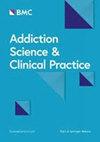Predictors of treatment outcome for individuals with alcohol use disorder with a goal of controlled drinking
IF 3.7
2区 医学
Q1 SUBSTANCE ABUSE
引用次数: 0
Abstract
Research is lacking on predictors of outcome for the treatment of alcohol use disorder (AUD) with a goal of controlled drinking (CD). The aim of the study was to investigate one-year outcomes of an RCT, investigating Behavioral Self-Control Training (BSCT) and Motivational Enhancement Therapy (MET) and predictors of positive outcome for weekly alcohol consumption, CD and symptom reduction in AUD. This study is based on secondary analyses from a randomized controlled trial including 250 individuals with AUD (52% men) recruited from three specialized addiction clinics in Stockholm, Sweden. Linear and logistic mixed regression models were used for outcomes at 52 weeks, and linear and logistic regression models for the predictor analyses. BSCT was superior to MET for the change between baseline to 52 weeks for the outcome of CD, defined as low-risk drinking below ten standard drinks per week for both genders (p = 0.048). A total of 57% of individuals in BSCT attained a level of CD, as opposed to 43% in MET. Females were significantly better in attaining low-risk drinking levels compared to men. The predictor for obtaining CD and reducing weekly alcohol consumption, was a lower baseline alcohol consumption. Predictors of symptom reduction in AUD were lower baseline level of AUD, and a lower self-rated impaired control over alcohol consumption. BSCT was superior to MET in obtaining CD levels, and women were superior to men for the same outcome. The study corroborated baseline consumption levels as an important predictor of outcome in CD treatments. The study contributes with important knowledge on key treatment targets, and knowledge to support and advice patients in planning for treatment with a goal of controlled drinking. Trial registration: The original study was registered retrospectively at isrtcn.com (14539251).以控制饮酒为目标的酒精使用障碍患者治疗结果的预测因素
对于以控制饮酒(CD)为目标的酒精使用障碍(AUD)治疗结果的预测因素,目前还缺乏研究。本研究旨在调查一项随机对照试验的一年结果,研究行为自控训练(BSCT)和动机增强疗法(MET),以及预测每周饮酒量、控制饮酒和减少 AUD 症状的积极结果的因素。本研究基于一项随机对照试验的二次分析,该试验包括从瑞典斯德哥尔摩三家专业成瘾诊所招募的 250 名 AUD 患者(52% 为男性)。52周的结果采用线性和逻辑混合回归模型,预测分析采用线性和逻辑回归模型。就基线到 52 周的 CD 结果变化而言,BSCT 优于 MET,MET 被定义为低风险饮酒,男女均低于每周十杯标准酒量(P = 0.048)。在 BSCT 中,共有 57% 的人达到了 CD 水平,而在 MET 中只有 43%。女性在达到低风险饮酒水平方面明显优于男性。获得低风险饮酒水平并减少每周饮酒量的预测因素是较低的基线饮酒量。AUD症状减轻的预测因素是较低的AUD基线水平和较低的自评饮酒控制能力受损程度。在获得 CD 水平方面,BSCT 优于 MET,在相同结果方面,女性优于男性。研究证实,基线消费水平是 CD 治疗结果的重要预测因素。该研究为关键治疗目标提供了重要知识,并为患者规划以控制饮酒为目标的治疗提供了支持和建议。试验登记:原始研究在isrtcn.com(14539251)上进行了回顾性注册。
本文章由计算机程序翻译,如有差异,请以英文原文为准。
求助全文
约1分钟内获得全文
求助全文
来源期刊

Addiction Science & Clinical Practice
Psychology-Clinical Psychology
CiteScore
3.90
自引率
10.80%
发文量
64
审稿时长
28 weeks
期刊介绍:
Addiction Science & Clinical Practice provides a forum for clinically relevant research and perspectives that contribute to improving the quality of care for people with unhealthy alcohol, tobacco, or other drug use and addictive behaviours across a spectrum of clinical settings.
Addiction Science & Clinical Practice accepts articles of clinical relevance related to the prevention and treatment of unhealthy alcohol, tobacco, and other drug use across the spectrum of clinical settings. Topics of interest address issues related to the following: the spectrum of unhealthy use of alcohol, tobacco, and other drugs among the range of affected persons (e.g., not limited by age, race/ethnicity, gender, or sexual orientation); the array of clinical prevention and treatment practices (from health messages, to identification and early intervention, to more extensive interventions including counseling and pharmacotherapy and other management strategies); and identification and management of medical, psychiatric, social, and other health consequences of substance use.
Addiction Science & Clinical Practice is particularly interested in articles that address how to improve the quality of care for people with unhealthy substance use and related conditions as described in the (US) Institute of Medicine report, Improving the Quality of Healthcare for Mental Health and Substance Use Conditions (Washington, DC: National Academies Press, 2006). Such articles address the quality of care and of health services. Although the journal also welcomes submissions that address these conditions in addiction speciality-treatment settings, the journal is particularly interested in including articles that address unhealthy use outside these settings, including experience with novel models of care and outcomes, and outcomes of research-practice collaborations.
Although Addiction Science & Clinical Practice is generally not an outlet for basic science research, we will accept basic science research manuscripts that have clearly described potential clinical relevance and are accessible to audiences outside a narrow laboratory research field.
 求助内容:
求助内容: 应助结果提醒方式:
应助结果提醒方式:


